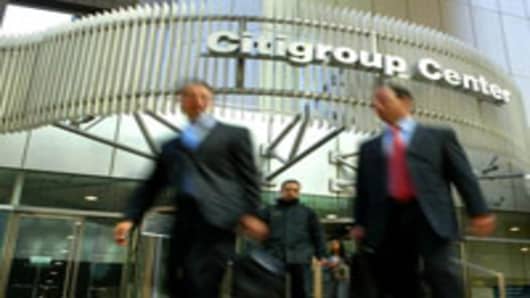What about all these short-term considerations – govt. exiting its stake? layoffs? Which businesses doing well now? Citi Holdings? Tell us:
Sorry. No questions and no answers. Most of the value of Citigroup is based on what you expect in year 3 to infinity. I spent my time on structural questions that go towards this long-term value. Sometimes my questions are different from those of others.
Were there any tense moments during the meeting?
The discussion on DTA — deferred tax assets — seems to touch a nerve. Citi seemed frustrated that I keep bringing up this issue, but this has nothing to do with what I think the company will earn versus the accounting rules. The rules are in place and Citi should follow them. I’m not sure that Citi will take a write-down, but they should if their risk culture has really changed.
Did they explain why you were “shut out” for so long?
Extremely disappointing. The CEO did not answer my question. I reminded the CEO that he said that I could have a meeting and then his instruction was not followed. This makes me wonder if his other instructions are getting followed, too, and if not who is watching those who are making and executing decisions at Citi.
Citigroup's Statement in Response to the Mike Mayo Meeting:
"Citi CEO Vikram Pandit and CFO John Gerspach met with Mr. Mayo and investors on Friday afternoon. We had a productive dialogue with the investors and covered a number of topics including Citi's unique global footprint and prospects for future growth as well as other business-related matters.
"Mr. Mayo raised several topics that he has written about recently in his research reports. He has been flat-out wrong and those criticisms were rebutted very clearly.
"First, Mr. Mayo's claim that Citi has incorrectly accounted for our deferred tax assets is without merit. A critical factor in determining the value of a company's deferred tax asset (DTA) is its future earnings power. Citi has returned to profitability in 2010, and importantly, our core businesses in Citicorp represent a strong, profitable franchise. Mr. Mayo himself estimates that Citi's net income will grow over 30% per year between 2010 and 2012 and Citi's total net income during this period by his estimates will exceed $37 billion. Mr. Mayo's own analysis underscores Citi's return to sustained profitability and growth. This view contradicts Mr. Mayo's statement on Citi's DTA.?
"Next, Mr. Mayo recently claimed that Citi is cutting its capital expenditures and that this is a risk to the firm's long-term success. Mr. Mayo based his claim on the 'Capital expenditures on premises and equipment' line in the Consolidated Statement of Cash Flows. Mr. Mayo is incorrect in his assertions. In fact, the recent reduction in the capital expenditures to $1.1 billion in 2009 reflects Citi becoming a more efficient firm. During 2006-08, we committed the resources to build several large data centers as part of a strategy to centralize our technology. That "large ticket" spending is now completed and we are concentrating on developing platforms that support our global businesses instead of continuing the past practices of having platforms built for each local business. We have reduced our real estate costs by leasing more and buying less; put in place stringent cost controls; and reduced our headcount by 110,000 people — all of which helped reduce our expenses by $11 billion last year.?
"Mr. Mayo has also asserted that Citi's discussion of our future growth prospects is a source of concern. According to Mr. Mayo, Citi will be tempted to take inappropriate short-term risk to meet what he describes as a growth target. Again, we disagree with his conclusion. Citi remains very comfortable with its previously disclosed future growth expectations that were first stated by CEO Vikram Pandit on March 11 at the Citi Financial Services Conference. Mr. Pandit said: "Over time, we believe that a compound annual growth rate for these assets [in our core Citicorp businesses] of around 5% is not unreasonable, particularly given our growth opportunities in emerging markets." We believe this comment on future growth is prudent and reflects the uniqueness of our global footprint, which we believe to be a source of significant future growth. For example, approximately one-third of Citicorp's assets are in emerging markets, where GDP growth is expected to be 2-3 times that of developed economies.? Citi believes providing management's perspective about our long term growth prospects is helpful to investors and is in line with industry practice. Mr. Mayo's assertion that our providing this perspective will somehow encourage inappropriate risk taking does not add up.
"In summary, and as Mr. Pandit and Mr. Gerspach noted in the meeting, Citi continues to make steady progress in 2010. Despite a challenging market environment, we have earned $7.1 billion in net income year to date. Our capital strength remains very strong with a Tier 1 Capital Ratio of 12.0%, one of the highest ratios amongst our peer group. We have also continued to make progress on Citi Holdings, which we are unwinding in an economically rational way — these assets made up less than 25% of our balance sheet as of June 30 — and we expect them to be less than 20% by year-end with the sale of The Student Loan Corporation. Throughout Citi, we are executing our strategy to serve our clients with a singular focus on our three core businesses — Transaction Services, Securities and Banking, and Regional Consumer Banking — while taking advantage of our global footprint and ability to innovate."?
Questions? Comments? Email us atNetNet@cnbc.com
Follow NetNet on Twitter @ twitter.com/CNBCnetnet
Facebook us @ www.facebook.com/NetNetCNBC



